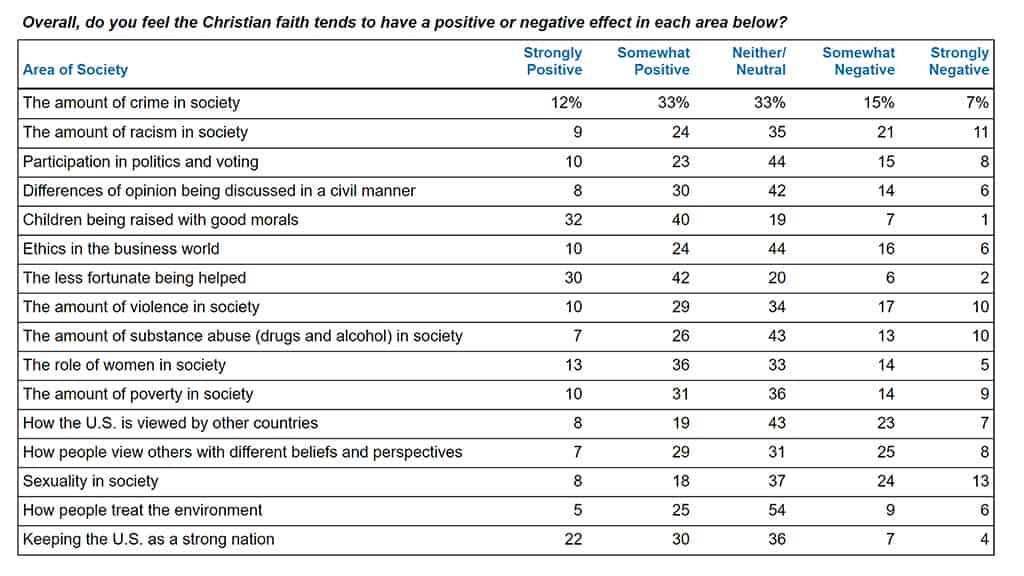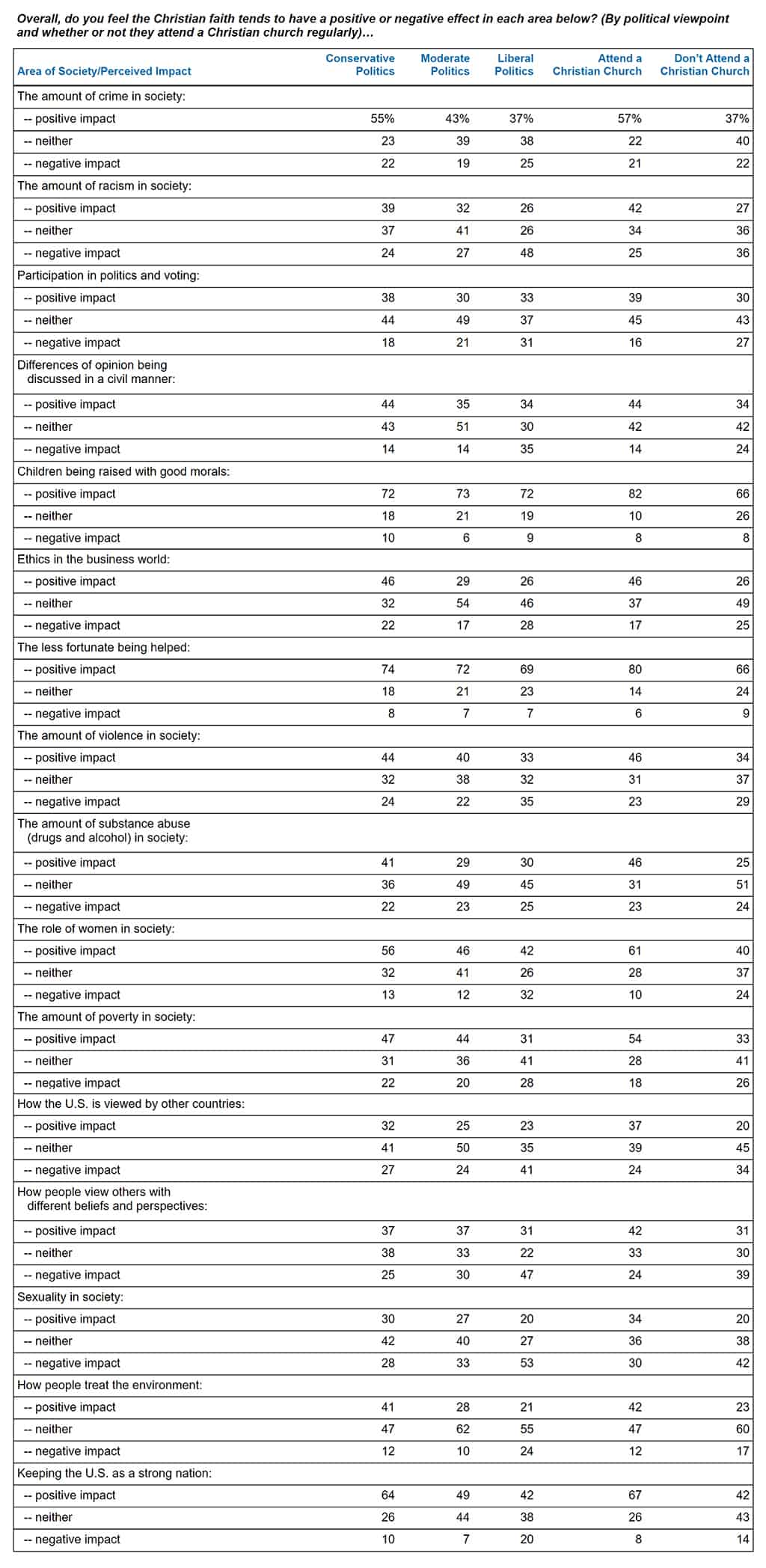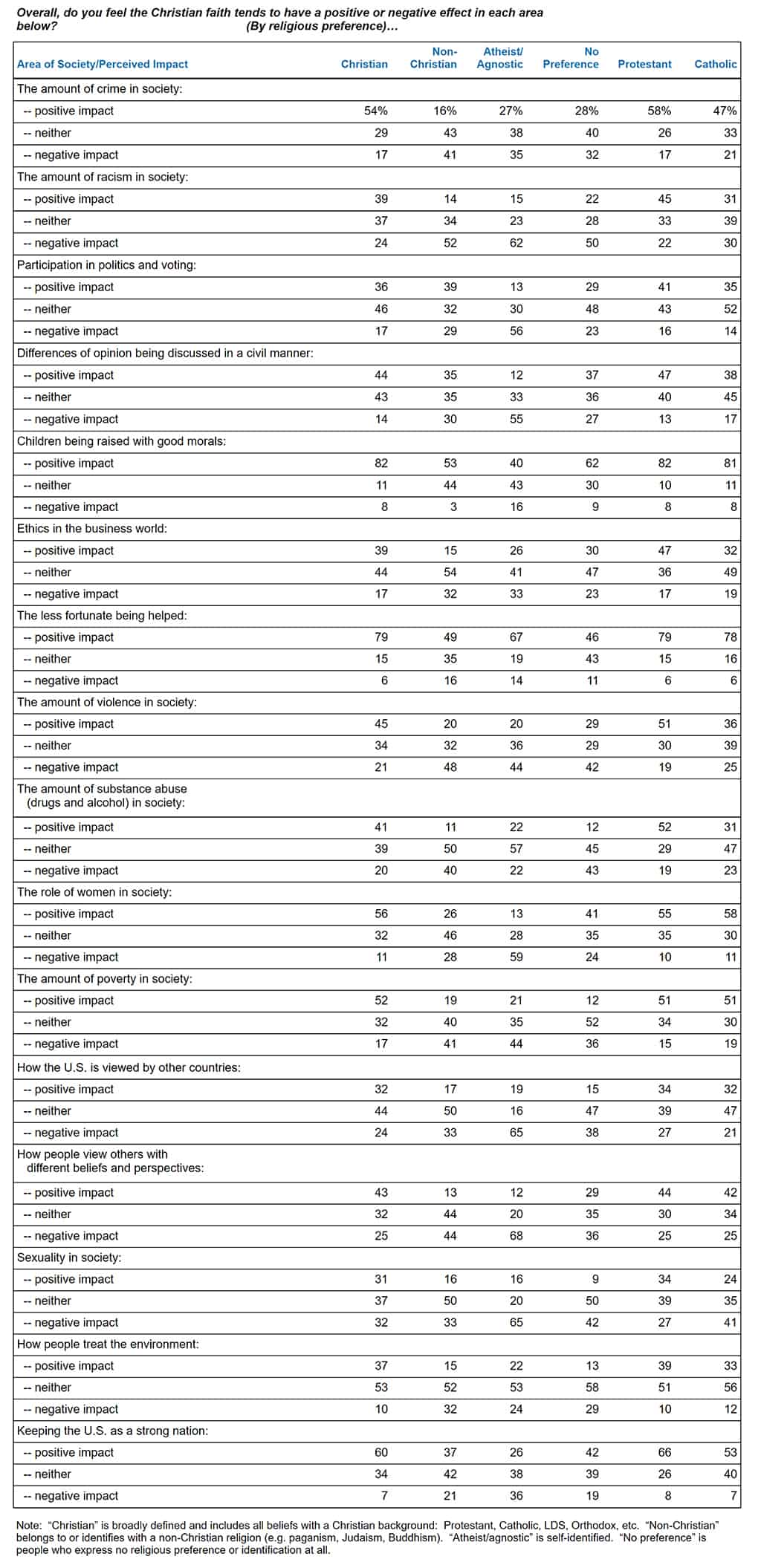Most Americans don’t feel the Christian faith positively impacts racism and sexuality in society; the perceived impact of the Christian faith on American society is explored
Access a copy of the full report here.
(Original release date: April 6, 2012) What impact does the Christian faith really have on American society? That question was posed to over 1,000 Americans as part of a study conducted by Grey Matter Research (Phoenix, Arizona).
The survey asked a demographically representative sample of American adults whether they feel the Christian faith generally has a positive impact, a negative impact, or no real impact on 16 different areas of society, including sexuality, poverty, business ethics, crime, the role of women in society, and how people treat the environment.
Two areas stand out from the other 14 in terms of highly positive views of the Christian faith: children being raised with good morals, and the less fortunate being helped. Among all Americans, 72% believe the Christian faith has a positive impact on children being raised with good morals, while 19% feel the faith has no real impact, and 8% believe it has a negative impact in this area. As for the less fortunate being helped, 72% see the Christian faith as having a positive impact, 20% perceive no real impact, and 8% feel there is a negative impact.
However, those are the only two of the tested areas for which a clear majority of Americans perceive a positive impact coming from the Christian faith. Two other areas show around half of all Americans perceiving a positive impact. Fifty-two percent believe the Christian faith positively impacts keeping the United States as a strong nation (36% see no real impact, while 11% believe the faith has a negative impact). Forty-nine percent see a positive impact on the role of women in society, while 33% perceive no real impact, and 19% see a negative impact in this area.
A number of other areas show more people seeing a positive impact than a negative impact on society, but still less than half of all Americans perceiving a positive impact:
- The amount of crime in society: 45% positive, 33% no impact, 22% negative
- The amount of poverty in society: 41% positive, 36% no impact, 23% negative
- The amount of violence in society: 39% positive, 34% no impact, 27% negative
- Differences of opinion being discussed in a civil manner: 38% positive, 42% no impact, 20% negative
- Ethics in the business world: 34% positive, 44% no impact, 22% negative
- Participation in politics and voting: 33% positive, 44% no impact, 23% negative
- The amount of substance abuse in society: 33% positive, 43% no impact, 23% negative
- How people treat the environment: 30% positive, 54% no impact, 15% negative
Four areas show a real split on how Christianity is viewed, with about as many Americans believing it affects society negatively as positively. One of these is the amount of racism in society. 33% believe the Christian faith positively impacts this, 35% see no real impact, and 32% think there is a negative impact on the amount of racism in society.
While 36% feel the Christian faith has a positive impact on how people view others with different beliefs and perspectives, 31% see the faith as having no real impact, and 33% feel it has a negative impact on this aspect of society.
Just 27% believe the Christian faith positively impacts how the U.S. is viewed by other nations, while 43% believe the faith has no real impact in this area, and 30% feel there is a negative effect.
The most negative perception is how the Christian faith impacts sexuality in society. Just 26% feel the faith has a positive impact in this area, while 37% see no real impact, and 37% believe it has a negative impact.
If the 16 different areas are averaged together, the typical perception of the Christian faith is that 13% of all Americans believe it has a strongly positive impact, 29% see a somewhat positive impact, 37% see no impact, 15% perceive a somewhat negative impact, and 7% believe the faith has a strongly negative impact on American society.
Consistently, Christianity is viewed very differently by different types of Americans. As might be expected, the biggest differences are by religious belief and participation. Yet Christians are not as positive toward the impact of the Christian faith – nor non-Christians as negative –as might be assumed.
Among people who either attend a Christian church (broadly defined to include Catholic, Protestant, Orthodox, LDS, etc.) or who claim their religious identity as Christian, when all of the individual ratings are combined, the average is that 15% rate the impact of Christianity as strongly positive, 33% as somewhat positive, 35% as neutral, 13% as somewhat negative, and 4% as strongly negative. These numbers are very similar to the average rating by the total population, because seven out of ten Americans identify with the Christian faith.
The average rating is a bit more positive for people who actually attend worship services, and much more positive for those who read the Bible at least once a month. For the 16 different areas of society evaluated in this study, the average for churchgoing Christians is that 19% see a strongly positive impact, while 33% see a somewhat positive impact, and 31% see no real impact. Among self-identified Christians who do not attend worship services, the average is that 11% see a strong positive impact, while 33% see some positive impact, and 40% perceive no real impact.
When all the individual areas of impact are averaged together, 19% of Bible-reading Christians feel the Christian faith has a strong positive impact on society, 32% perceive some positive impact, and 29% say there is no impact. Among self-identified Christians who do not read the Bible at all, just 9% on average perceive the faith as having a strong positive impact on society, while 31% see just some positive impact, and 41% believe it has no impact.
One of the strongest differences within the Christian community is according to whether respondents are evangelical or not. On average, 32% of evangelicals see the Christian faith as making a strongly positive impact on American society, while another 29% feel it has a somewhat positive impact, and 23% see no real impact. Among non-evangelical Christians, 13% see a strongly positive impact, while 33% see a somewhat positive impact, and 37% feel there is no real impact.
Non-Christians are far less complimentary toward Christianity than is the broadly Christian population, but praise for the faith still exists. For example, among people who identify with a religion other than Christianity (e.g. Islam, Buddhism, Judaism), 49% still believe the Christian faith positively impacts the less fortunate being helped, 53% believe the faith has a positive impact on children being raised with good morals, and 37% even believe the faith has a positive effect on keeping the U.S. as a strong nation. In only one of the 16 areas do a majority of adherents to a non-Christian religion feel the Christian faith has a negative impact, and that’s in the amount of racism in society.
Among people who are atheist or agnostic, 67% still believe the Christian faith positively impacts the less fortunate being helped, and 40% say there is a positive effect on children being raised with good morals. For nine of the 16 areas, a minority of atheists and agnostics believe the Christian faith has a negative impact on American society.
There are also political differences on how the faith is perceived. Democrats and self-described political liberals are generally much less likely than Republicans and political conservatives to believe the Christian faith has a positive impact on American society, and more likely to feel it has a negative impact. However, Republicans and conservatives are more likely to identify with the Christian faith, attend worship services, and read the Bible, which are the driving factors in how people feel about Christianity more so than are political perspectives.
Ron Sellers, president of Grey Matter Research, noted that people who identify with Christianity often are still critical of the impact the Christian faith has on society. “People who are Christian don’t just view their faith through rose-colored glasses,” Sellers said. “Even among those who actively attend church and read the Bible, there are frequent criticisms that the Christian faith is not having a strongly positive impact on society, and in fact sometimes that the faith is impacting things negatively. Of course, at the same time, many non-Christians give credit to the Christian faith for making positive contributions to society in some areas. It’s not quite as black-or-white as some might think.”
Sellers also noted a few surprises in the findings. He observed, “Various Christian groups take a lot of flak for their views on gender issues. Many denominations don’t ordain women, there are accusations that pro-life views or opposition to contraception are views which subjugate women, conservative groups are criticized for espousing more traditional gender roles, etc. Therefore it will probably surprise a lot of people that one of the areas for which the Christian faith receives the most praise is its positive impact on the role of women in society.”
Finally, Sellers pointed out that to Christian leaders, it may be far more worrisome that so many Americans feel the Christian faith has no impact in many areas than any perceptions of negative impact. “The old saying is that you can’t make an omelet without breaking a few eggs. It’s not surprising that some people feel the Christian faith has a negative impact in areas such as sexuality or how the U.S. is viewed in other countries. For instance, if a Christian group puts forth a message that is strongly pro-life, or advocates for freedom of Christian worship in a Muslim country, people with opposing viewpoints can easily perceive a negative impact in those areas. What should be really concerning for faith leaders is how many Americans see the Christian faith as not really having an impact at all,” Sellers said. He observed that more than four out of ten Americans see no real impact from the Christian faith in how people treat the environment, differences of opinion being discussed in a civil manner, participation in politics and voting, how the U.S. is viewed by other countries, the amount of substance abuse in society, and ethics in the business world.
Study Details:
The study was conducted by Grey Matter Research, a market research and consumer insights firm located in Phoenix, Arizona. The sample of 1,011 adults is accurate to within ±3.1 percentage points at the 95 percent confidence level with a 50 percent response distribution.
The study was conducted in all 50 states. Respondents’ age, education, household income, geography, racial/ethnic background, and gender were carefully tracked and weighted to ensure appropriate representation and accuracy.



